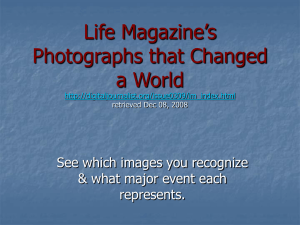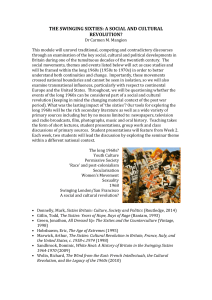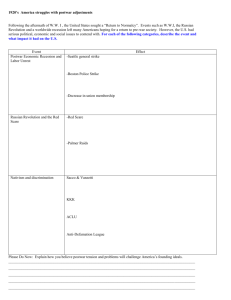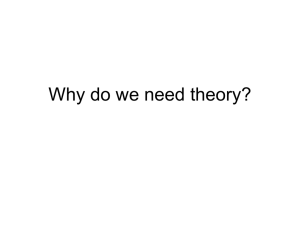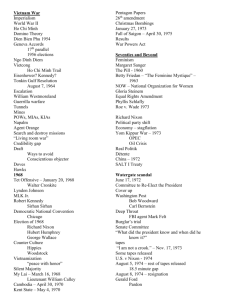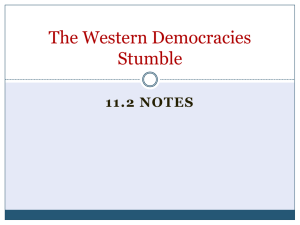Europe in the 1960s: Youth, Culture, and Politics
advertisement
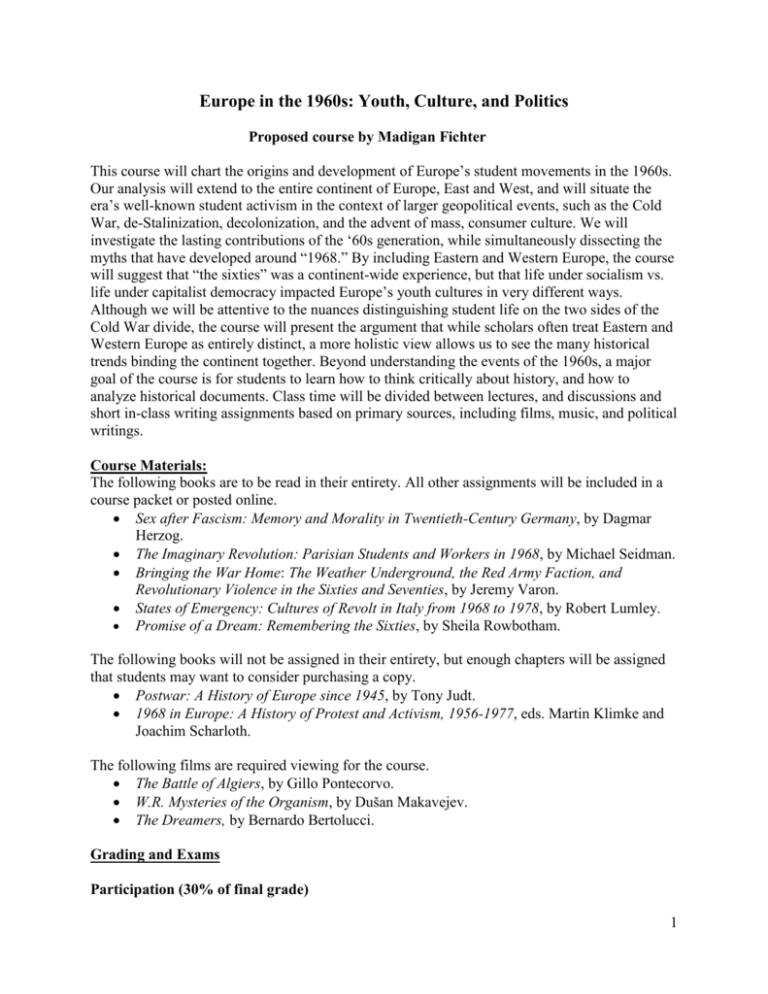
Europe in the 1960s: Youth, Culture, and Politics Proposed course by Madigan Fichter This course will chart the origins and development of Europe’s student movements in the 1960s. Our analysis will extend to the entire continent of Europe, East and West, and will situate the era’s well-known student activism in the context of larger geopolitical events, such as the Cold War, de-Stalinization, decolonization, and the advent of mass, consumer culture. We will investigate the lasting contributions of the ‘60s generation, while simultaneously dissecting the myths that have developed around “1968.” By including Eastern and Western Europe, the course will suggest that “the sixties” was a continent-wide experience, but that life under socialism vs. life under capitalist democracy impacted Europe’s youth cultures in very different ways. Although we will be attentive to the nuances distinguishing student life on the two sides of the Cold War divide, the course will present the argument that while scholars often treat Eastern and Western Europe as entirely distinct, a more holistic view allows us to see the many historical trends binding the continent together. Beyond understanding the events of the 1960s, a major goal of the course is for students to learn how to think critically about history, and how to analyze historical documents. Class time will be divided between lectures, and discussions and short in-class writing assignments based on primary sources, including films, music, and political writings. Course Materials: The following books are to be read in their entirety. All other assignments will be included in a course packet or posted online. Sex after Fascism: Memory and Morality in Twentieth-Century Germany, by Dagmar Herzog. The Imaginary Revolution: Parisian Students and Workers in 1968, by Michael Seidman. Bringing the War Home: The Weather Underground, the Red Army Faction, and Revolutionary Violence in the Sixties and Seventies, by Jeremy Varon. States of Emergency: Cultures of Revolt in Italy from 1968 to 1978, by Robert Lumley. Promise of a Dream: Remembering the Sixties, by Sheila Rowbotham. The following books will not be assigned in their entirety, but enough chapters will be assigned that students may want to consider purchasing a copy. Postwar: A History of Europe since 1945, by Tony Judt. 1968 in Europe: A History of Protest and Activism, 1956-1977, eds. Martin Klimke and Joachim Scharloth. The following films are required viewing for the course. The Battle of Algiers, by Gillo Pontecorvo. W.R. Mysteries of the Organism, by Dušan Makavejev. The Dreamers, by Bernardo Bertolucci. Grading and Exams Participation (30% of final grade) 1 All students are expected to complete the assigned readings and to participate in class discussions. In-class quizzes and in-class writing assignments are considered part of the participation grade. Midterm Exam (30% of final grade) The midterm grade will consist of an in-class written exam. Students will be given a choice of several essays that ask them to reflect on the major themes that we have discussed in class. Final Assignment (40% of final grade) The final assignment will be a 7-8 page essay that requires students to conduct primary source research on an aspect of Europe’s student movements that they find interesting. Students must choose a topic with sources in a language that they can understand, or that exist in a reliable translation. Students will further be required to make a brief, in-class presentation of their research. Weekly Assignments Part One: Context and Origins Week 1: Postwar Postwar: A History of Europe since 1945, by Tony Judt: Chapter 1: “The Legacy of War,” Chapter 5: “The Coming of the Cold War,” Chapter 6: “Into the Whirlwind.” Chapter 1: “War as Revolution,” by Jan Gross in The Establishment of Communist Regimes in Eastern Europe, 1944-1949. “Empire by Invitation? The United States and Western Europe, 1945-1952,” by Geir Lundestad, in Journal of Peace Research. “The Cold War: What Do We Now Know,” by Melvyn Leffler in American Historical Review. Primary Sources: “The Two Camp Policy” by Andrei Zhdanov, “Ketman” by Czesław Miłosz, “Sinews of Peace,” by Winston Churchill. Week Two: Stability, Thaw, and Affluence Postwar: Chapter 8: “The Politics of Stability,” Chapter 9: “Lost Illusions,” Chapter 10: “The Age of Affluence.” Return to Diversity: A Political History of East Central Europe since World War II, by Joseph Rothschild and Nancy M. Wingfield: Chapter 4: “The Dialectics of Stalinism and Titoism,” Chapter 5: “Revenge of the Repressed: East Central Europe Reasserts Itself.” The Transatlantic Century: Europe and America, 1890-2010, by Mary Nolan: Chapter 7: “Cooperation, Competition, Containment,” Chapter 8: “Culture Wars.” Primary Sources: “On the Cult of Personality and Its Consequences,” by Nikita Khrushchev. Week Three: The Cold War Order and Its Critics “The Imperialism of Decolonization,” by WM. Roger Louis and Ronald Robinson, in Ends of British Imperialism: The Scramble for Empire, Suez, and Decolonization. 2 The Wretched of the Earth, by Franz Fanon: Chapter 4: “On National Culture: Mutual Foundations for National Culture and Liberation Struggles,” Chapter 5: “Colonial War and Mental Disorders.” “Repressive Tolerance,” by Herbert Marcuse. “On Practice and Dogma,” by Danko Grlić, in Praxis. Required film viewing: The Battle of Algiers, by Gillo Pontecorvo. Part Two: Counterculture and Student Rebellions Week Four: Counterculture 1968 in Europe: A History of Protest and Activism, 1956-1977: Chapter 1: “Subcultural Movements,” Chapter 2: “Situationism.” Between Marx and Coca-Cola: Youth Cultures in Changing European Societies: Introduction: “Youth, Consumption, and Politics in the Age of Radical Change,” Chapter 1: “Youth Culture and the Cultural Revolution of the Long Sixties.” Rock around the Bloc: A History of Rock Music in Eastern Europe and the Soviet Union, by Timothy Ryback: Introduction, Chapter 3: “Bards of Discontent, 19561965,” Chapter 4: “Beatlemania: Leninism Versus Lennonism, 1960-1966,” Chapter 5: “You Say You Want a Revolution, 1965-1969.” Primary Sources: Assigned examples of rock ‘n’ roll and folk music from Eastern and Western Europe. Week Five: Sexual Politics Sex after Fascism: Memory and Morality in Twentieth-Century Germany, by Dagmar Herzog. Eros and Civilization, by Herbert Marcuse: Chapter 7: “Phantasy and Utopia.” Required film viewing: Mysteries of the Organism, by Dušan Makavejev. Week Six: Student Rebellions (I): France and Poland The Imaginary Revolution: Parisian Students and Workers in 1968, by Michael Seidman, first half. “Red State, Golden Youth: Student Culture and Political Protest in 1960s Poland,” by Malgorzata Fidelis, in In Between the Avant-Garde and the Everyday: Subversive Politics in Europe from 1957 to the Present. Primary Source: Daniel Cohn-Bendit and Gabriel Cohn-Bendit, “The Battle of the Streets: ‘C’est Pour Toi.” Week Seven: Student Rebellions (II): Yugoslavia and Italy Postwar: Chapter 13: “The End of the Affair.” 1968 in Europe: Chapter 18: “Yugoslavia.” States of Emergency: Cultures of Revolt in Italy from 1968 to 1978, by Robert Lumley. 3 Primary Source: “Political Action Program,” University of Belgrade, June 5th, 1968. Week Eight: Czechoslovak Youth and The Prague Spring “1968 East and West: Visions of Political Change and Student Protest from Across the Iron Curtain,” by Paulina Bren, in Transnational Moments of Change: Europe 1945, 1968, 198. Under a Cruel Star: A Life in Prague, by Heda Kovaly excerpts. Primary Sources: Two Thousand Words to Workers, Farmers, Scientists, Artists, and Everyone,” by Ludvik Vaculik,” “Dubcek’s Address to the Nation.” Part Three: The Long 1960s and Its Legacies Week Nine: On Violence Bringing the War Home: The Weather Underground, the Red Army Faction, and Revolutionary Violence in the Sixties and Seventies, by Jeremy Varon. Primary source: Terror or Love? Bommi Baumann’s Own Story of His Life as a West German Urban Guerilla, by Michael Baumann, excerpts. Week Ten: The 1970s: New Movements Promise of a Dream: Remembering the Sixties, by Sheila Rowbotham. Joschka Fischer and the Making of the Berlin Republic, by Paul Hockenos: Part 3: “From Protests to Parliament.” “The Croatian Spring: Interpreting the Communist Heritage in Post-Communist Croatia,” by Marko Zubak, in East Central Europe/ECE. Primary Source: “Declaration of the Supreme Council of the Croatian Liberation Forces,” by Zvonko and Julienne Bušić. Week Eleven: Myths and Memories of ‘68 Postwar, by Tony Judt, Chapter 12, “The Spectre of Revolution”. The Imaginary Revolution, by Michael Seidman, second half. Required film: The Dreamers, by Bernardo Bertolucci. Week Twelve: Week 12: Legacies of the 1960s Postwar: Chapter 14: “Diminished Expectations,” Chapter 15: “Politics in a New Key,” Chapter 16: “A Time of Transition.” 1968 in Europe: Chapter 25: “Narratives of Democratization: 1968 in Postwar Europe.” Primary source: “The Future of 1968’s ‘Restless Youth,’” by Tom Hayden. 4
